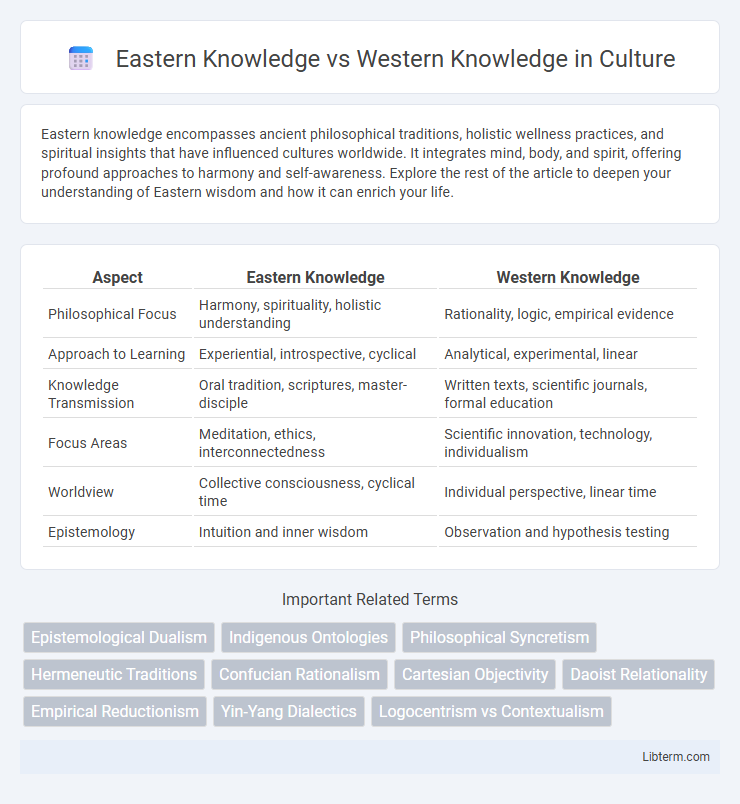Eastern knowledge encompasses ancient philosophical traditions, holistic wellness practices, and spiritual insights that have influenced cultures worldwide. It integrates mind, body, and spirit, offering profound approaches to harmony and self-awareness. Explore the rest of the article to deepen your understanding of Eastern wisdom and how it can enrich your life.
Table of Comparison
| Aspect | Eastern Knowledge | Western Knowledge |
|---|---|---|
| Philosophical Focus | Harmony, spirituality, holistic understanding | Rationality, logic, empirical evidence |
| Approach to Learning | Experiential, introspective, cyclical | Analytical, experimental, linear |
| Knowledge Transmission | Oral tradition, scriptures, master-disciple | Written texts, scientific journals, formal education |
| Focus Areas | Meditation, ethics, interconnectedness | Scientific innovation, technology, individualism |
| Worldview | Collective consciousness, cyclical time | Individual perspective, linear time |
| Epistemology | Intuition and inner wisdom | Observation and hypothesis testing |
Defining Eastern and Western Knowledge
Eastern Knowledge encompasses philosophical traditions rooted in Asia, such as Confucianism, Buddhism, and Taoism, emphasizing holistic understanding, interconnectedness, and experiential wisdom. Western Knowledge primarily derives from Ancient Greek philosophy and Enlightenment thinking, prioritizing empirical evidence, analytical reasoning, and individualism. These distinct epistemologies shape diverse approaches to knowledge acquisition, interpretation, and application across cultures.
Historical Foundations of Eastern Thought
Eastern knowledge is deeply rooted in ancient philosophies such as Confucianism, Taoism, and Buddhism, emphasizing harmony, balance, and interconnectedness. Texts like the Tao Te Ching and the Analects serve as foundational pillars, shaping ethical, metaphysical, and epistemological perspectives in Eastern societies. These traditions prioritize experiential wisdom and collective well-being, contrasting with the more analytical and individualistic approaches of Western knowledge systems.
Roots of Western Intellectual Tradition
The roots of Western intellectual tradition trace back to ancient Greece, where philosophers like Socrates, Plato, and Aristotle established foundational principles of reason, empiricism, and dialectic methods. This tradition emphasizes analytical thinking, individualism, and the scientific method, driving advancements in philosophy, science, and political theory. In contrast, Eastern knowledge systems, such as Confucianism, Taoism, and Buddhism, prioritize holistic understanding, harmony, and interconnectedness, reflecting divergent epistemologies shaped by cultural and historical contexts.
Core Philosophies: Comparison and Contrast
Eastern knowledge centers on holistic understanding and interconnectedness, emphasizing balance, harmony, and the cyclical nature of life through philosophies like Taoism, Confucianism, and Buddhism. Western knowledge prioritizes analytical reasoning, individualism, and empirical evidence, rooted in traditions such as Greek philosophy, Cartesian dualism, and Enlightenment rationalism. The contrast lies in Eastern thought valuing intuitive wisdom and collective well-being, while Western frameworks focus on logic, individual rights, and scientific inquiry.
Methods of Acquiring Knowledge
Eastern knowledge traditionally emphasizes experiential learning, meditation, and holistic observation as key methods of acquiring knowledge, often integrating spirituality and intuition. Western knowledge typically relies on empirical evidence, scientific experimentation, and logical reasoning, prioritizing systematic observation and reproducibility. Both approaches value knowledge acquisition but differ fundamentally in methodologies, with Eastern methods focusing on internal insight and Western methods on external validation.
The Role of Intuition vs. Rationalism
Eastern knowledge systems emphasize intuition as a fundamental means of understanding reality, often valuing holistic perception and inner wisdom derived from meditation and direct experience. Western knowledge traditions prioritize rationalism, relying on logical analysis, empirical evidence, and systematic skepticism to build knowledge frameworks. The interplay between Eastern intuition and Western rationalism offers a comprehensive approach, blending subjective insights with objective validation for deeper epistemological balance.
Education Systems: East and West
Eastern education systems emphasize memorization, discipline, and respect for authority, fostering deep cultural knowledge and collective harmony. Western education prioritizes critical thinking, creativity, and individualism, encouraging analytical skills and innovation. Both systems shape learners differently, with Eastern methods promoting structure and tradition, and Western approaches nurturing independent problem-solving and exploration.
Cultural Influences on Knowledge Formation
Eastern knowledge systems emphasize holistic understanding and interconnectedness, heavily influenced by Confucianism, Taoism, and Buddhism, which shape cognitive approaches toward harmony and balance in nature and society. Western knowledge, grounded in Greek rationalism and Enlightenment values, prioritizes analytical reasoning, individualism, and empirical evidence as foundations for knowledge formation. Cultural frameworks fundamentally direct epistemological perspectives, impacting methodologies, validation criteria, and dissemination of knowledge across global traditions.
Modern Integration and Globalization
Eastern knowledge systems emphasize holistic understanding, interconnectedness, and non-linear thinking, while Western knowledge prioritizes analytical reasoning, empirical evidence, and linear progression. Modern integration of these approaches in globalization fosters innovative problem-solving by blending Eastern philosophies with Western scientific methods, enhancing cross-cultural collaboration. This synergy supports sustainable development, technological advancement, and a more inclusive global knowledge economy.
Future Perspectives: Bridging the Gap
Future perspectives in bridging Eastern and Western knowledge emphasize integrating holistic Eastern philosophies with Western scientific rigor to address global challenges. Collaborative frameworks leveraging the strengths of both traditions promote innovation in healthcare, environmental sustainability, and education. Advancements in technology and cross-cultural research partnerships play a critical role in fostering mutual understanding and synthesizing diverse knowledge systems.
Eastern Knowledge Infographic

 libterm.com
libterm.com